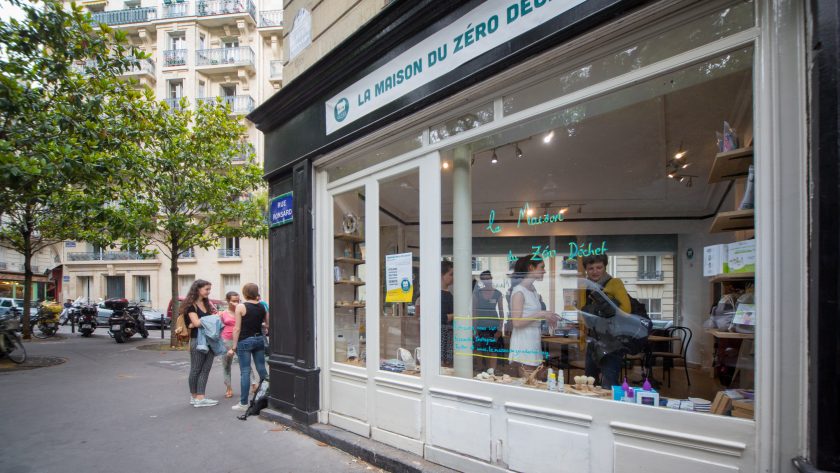Welcome to the magical world of zero waste, where every small action can make a big difference. In a world drowning in its own waste, practicing zero waste is a revolutionary lifestyle that offers a glimmer of hope for a greener, cleaner tomorrow. In this article, we will embark on a journey to explore the art of reducing household waste, also known as « Comment Pratiquer le Zéro Déchet pour Réduire les Déchets Domestiques » in French. Brace yourself for a thought-provoking adventure filled with practical tips, ingenious hacks, and a hint of creativity that will inspire you to join the global movement towards sustainability. Let’s dive deep into the realm of zero waste and discover how it can transform not only our homes but also the world we live in.
Reducing Household Waste: A Beginner’s Guide to Practicing Zero Waste
Living a zero waste lifestyle may seem like a daunting task, but with a few simple changes, you can drastically reduce your household waste. In this beginner’s guide, we will explore some practical tips and strategies to help you practice zero waste and contribute to a more sustainable future.
1. Embrace the mantra of « Refuse, Reduce, Reuse, Recycle »
- Refuse: Say no to unnecessary packaging, single-use items, and anything that will eventually end up in the trash. Be conscious of your consumption and only bring items into your home that you truly need.
- Reduce: Minimize your waste by actively seeking out products with less packaging and practicing mindful consumption. Consider buying in bulk, which reduces packaging waste, and opt for durable, long-lasting items over disposable ones.
- Reuse: Get creative and find ways to reuse items instead of throwing them away. Repurpose glass jars for storage, use cloth napkins instead of disposable ones, and repair broken items instead of immediately replacing them.
- Recycle: When all other options have been exhausted, properly recycle the materials that can be recycled. Familiarize yourself with the recycling guidelines in your community and ensure your recyclables are clean and free of contamination.
2. Adopt sustainable shopping habits
- Bring your own bags: Always carry reusable shopping bags with you to avoid using single-use plastic bags. Keep a stash in your car or near your front door so they are easily accessible.
- Shop local and bulk: Supporting local markets and buying in bulk reduces packaging waste and supports your local economy. Bring your own cloth or mesh bags for produce and reusable containers for bulk items.
- Choose quality over quantity: Invest in high-quality products that are built to last. By purchasing items that are durable and can be repaired, you avoid contributing to the cycle of disposable, low-quality products that quickly end up in landfills.
- Opt for eco-friendly alternatives: Explore eco-friendly options for common household products, such as switching to cloth diapers, using refillable cleaning products, and choosing compostable or reusable menstrual products.
With these practical steps, you can start your journey towards practicing zero waste and making a positive impact on the environment. Remember, every small action counts, and your efforts can inspire others to join the movement towards a more sustainable future.

The Psychology behind Adopting Zero Waste Lifestyle: Changing Mindsets and Habits
Living a zero waste lifestyle has become a growing trend in recent years as individuals become more conscious of their environmental impact. But what is the psychology behind adopting a zero waste lifestyle? Why do people make the decision to change their mindsets and habits? Understanding the psychological motivations behind this movement can help us better comprehend why individuals are eager to reduce their waste and make more sustainable choices.
One of the key factors behind the adoption of a zero waste lifestyle is the desire to live a more meaningful and purposeful life. Many people feel a sense of fulfillment and satisfaction when they actively contribute to environmental sustainability. By reducing their waste, individuals feel that they are making a tangible difference in protecting the planet and preserving its resources for future generations. This sense of purpose often serves as a powerful motivator in changing mindsets and habits.
- Another psychological aspect of adopting a zero waste lifestyle is the feeling of empowerment. By taking control over their waste production, individuals become active agents of change in their own lives and the world around them. This sense of empowerment fuels individuals’ motivation to continue making sustainable choices and encourages them to inspire others to do the same.
- Moreover, the sense of community and belonging that comes with the zero waste movement is another significant psychological factor. Connecting with like-minded individuals who share similar values and goals helps individuals stay motivated and find support during their zero waste journey. This community aspect fosters a sense of belonging and provides a space for individuals to learn, share, and grow together.
- Additionally, embracing a zero waste lifestyle can significantly impact one’s overall well-being and mental health. Many studies have shown that being mindful of waste reduction and living sustainably can reduce stress and anxiety while increasing feelings of happiness and fulfillment. The act of simplifying one’s life and prioritizing experiences over material possessions can bring a sense of inner peace and contentment.
Ultimately, the psychology behind adopting a zero waste lifestyle is driven by a combination of factors, including the desire for purpose and meaning, empowerment, community, and improved well-being. By understanding these psychological motivations, we can further encourage and support individuals on their journey towards reducing waste and creating a more sustainable future.

Practical Tips and DIY Hacks for Minimizing Household Waste
If you’re looking for practical tips and DIY hacks to minimize household waste, you’ve come to the right place. Embracing the concept of « zero waste » can be both rewarding and challenging, but with a little creativity and determination, reducing your household waste is definitely achievable. Here are some creative ideas to help you get started:
- Reuse and repurpose: Instead of throwing things away, explore ways to give your items a new purpose. Turn old jars into storage containers, transform worn-out T-shirts into cleaning rags, or repurpose containers as plant pots. The possibilities are endless!
- Composting: Start composting your food scraps and yard waste. Not only does this divert waste from landfills, but it also creates nutrient-rich soil for your garden. Consider setting up a small composting bin or using a community composting program if available.
Continuing on our zero waste journey, let’s explore some more practical tips:
- Buy in bulk: Reduce packaging waste by purchasing items in bulk. Bring your own reusable containers or bags to the store and fill them with staples like grains, nuts, and spices. This not only minimizes waste but can also save you money in the long run.
- Switch to reusable alternatives: Replace single-use items with reusable alternatives. Invest in a stainless steel water bottle, reusable shopping bags, and cloth napkins. And don’t forget to bring your own travel mug for takeaway coffee or tea!

Creating Sustainable Communities: Collaborating for Zero Waste Solutions
Living in a sustainable community is not just about reducing our carbon footprint; it’s also about adopting practices that minimize waste and promote a zero-waste lifestyle. By collaborating with our neighbors and implementing innovative solutions, we can create a cleaner and healthier environment for ourselves and future generations.
One practical way to practice zero waste at home is by embracing the 5 R’s: Refuse, Reduce, Reuse, Recycle, and Rot. By following these principles, we can significantly reduce the amount of waste we produce. Here are some creative suggestions:
- Refuse: Say no to single-use plastic items such as straws, shopping bags, and disposable cutlery. Instead, opt for sustainable alternatives like reusable stainless steel straws and cloth shopping bags.
- Reduce: Minimize your consumption by carefully considering what you really need. Whether it’s clothes, electronics, or household items, choose quality over quantity and only purchase items that you truly need.
- Reuse: Give new life to old items by finding creative ways to reuse them. Can that glass jar be used as a storage container? Can old t-shirts be turned into rags for cleaning?
- Recycle: Always recycle what you can, but remember that recycling should be a last resort. Focus on reducing and reusing first before resorting to recycling.
- Rot: Composting is a fantastic way to turn organic waste into nutrient-rich soil for your garden. Start a compost bin and divert those food scraps from the landfill.
By collaborating with our neighbors, we can organize community initiatives such as bulk buying or shared resources, reducing the overall waste generated. We can also establish communal composting areas and educate one another about the benefits of zero waste practices. Together, we can create sustainable communities that inspire others to join the movement and make a lasting impact on our environment.
In a world overflowing with single-use plastics and disposable everything, it’s time to step up and make a change. By embracing the Zero Waste lifestyle, we have the power to significantly reduce our household waste and make a positive impact on the environment.
From reusing glass jars for food storage to composting organic waste, there are countless ways to practice Zero Waste and embark on a journey towards a more sustainable future. But don’t worry, it’s not about sacrificing convenience or luxury – it’s about finding creative solutions and rethinking our consumption habits.
Imagine a life where your trash bin is practically empty, where you bring your own reusable bags to the grocery store, and where your commitment to the environment inspires others to follow suit. It may seem like a lofty goal, but with determination and a little creativity, it’s entirely within reach.
So, let’s dive into the world of Zero Waste and discover practical tips and tricks to reduce our household waste. Whether it’s crafting your own cleaning products or embracing minimalism, every small step counts. By being mindful of our choices and making conscious efforts to reduce waste, we become part of a global movement towards sustainability.
Remember, practicing Zero Waste doesn’t mean being perfect. It’s about progress, not perfection. It’s about embracing the journey and continuously finding ways to minimize our impact on the planet. So, let’s join forces and take a leap toward a future where our waste is diminished, our resources are preserved, and the Earth thrives.
In the end, our commitment to a Zero Waste lifestyle is not just about reducing our own household waste, but about creating a ripple effect that can lead to a better world for future generations. So, let’s come together and empower one another to embrace the beauty of simplicity, creativity, and sustainability. Together, we can make a difference, one Zero Waste step at a time.




